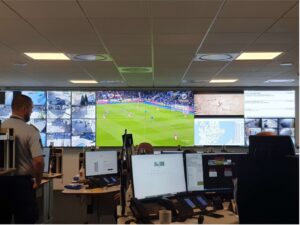An inside look at life as a Danish police officer.
By Skals International Project Class
Inside Holstebro Police Station
Our visit to Holstebro Police Station provided a unique glimpse into the daily lives of Denmark’s law enforcement officers. Guided by Jens Claumarch, a highly experienced police officer with 42 and a half years of service, we explored the station and gained valuable insights into the responsibilities, challenges, and realities of police work.
Jens, who is soon to retire, has worked at Holstebro Police Station since 2008 as a police commissioner and one of the heads of the security center (Vagtcentralen). Before that, he served in Viborg for six years. As he showed us around, he shared his experiences and reflections on his long career in law enforcement.
A Career in Law Enforcement
When asked what he loves most about his job, Jens highlighted the unpredictability of each day:
“That I don’t know what my day will bring. I can think we’ll have a quiet day, and then, within a minute and a half, a call from 112 comes in, and we’re off. We can also sit together—five, six, or seven of us—chatting and watching football when things are calm.”
However, police work isn’t just about fast-paced action. One of the toughest parts of the job, according to Jens, is delivering the worst possible news—informing people that a loved one has passed away. The way people react varies greatly, depending on the circumstances and the age of the deceased. While announcing the passing of an elderly person is always unfortunate, telling parents that their child has died is heartbreaking and one of the hardest aspects of police work.
Jens also shared how police training has evolved over time. When he attended the Danish Police Academy in Copenhagen, the education lasted three years. Today, the program has been shortened to two years and four months, making the training process more intensive.
Despite the challenges of the job, Jens emphasized his love for his work, mentioning that his wife even noticed he whistles when heading to work, a sign of his passion for policing.

Becoming a Police Officer in Denmark
Danish police officers play a crucial role in maintaining public safety, preventing crime, and enforcing laws across the country. In major cities such as Copenhagen, Aarhus, and Odense, officers even patrol on bicycles to increase their visibility and connection with the community.
To become a police officer in Denmark, candidates must complete a training program at the Danish National Police College in Copenhagen or Vejle. The process takes 2 years and 4 months, and applicants must meet strict criteria, including:
- Being at least 21 years old
- Being physically and mentally fit
- Having strong communication and teamwork skills
- Passing various academic, psychological, and physical tests
Some medical conditions, such as ADHD and autism, can disqualify candidates from police training.
The average salary for a Danish police officer depends on rank and experience, typically ranging from DKK 30,000 to DKK 35,000 per month.

Policing at Major Football Matches
Football is a beloved sport in Denmark, but with passionate fans come challenges—hooliganism and stadium violence are ongoing concerns. The police play a crucial role in maintaining order during high-stakes matches.
For games between Brøndby IF and FC Copenhagen (FCK), policing costs can reach DKK 1.5 million per match, with 700–1,000 officers on duty. Comparatively, in Spain’s El Clásico between Real Madrid and FC Barcelona, security costs can range from €500,000 to €1,000,000, with over 3,000 security personnel deployed.

Final Thoughts
Our visit to Holstebro Police Station was an eye-opening experience, providing us with a deeper understanding of the dedication, challenges, and unpredictability of police work. Officers like Jens Claumarch serve as a reminder that law enforcement is not just about fighting crime—it’s about being there for the community, offering help in times of crisis, and making a real difference in people’s lives.
A big thank you to Jens and the Holstebro Police Station for giving us this incredible opportunity to see law enforcement behind the scenes. 🚔